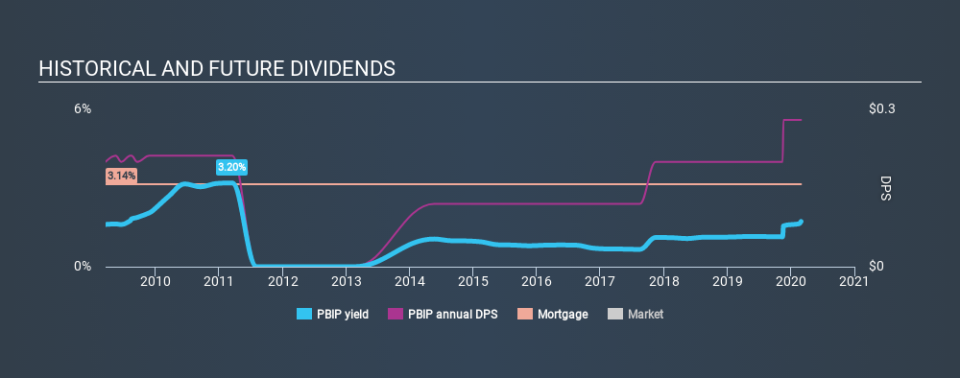Prudential Bancorp, Inc. (NASDAQ:PBIP) Looks Interesting, And It's About To Pay A Dividend

It looks like Prudential Bancorp, Inc. (NASDAQ:PBIP) is about to go ex-dividend in the next 4 days. Ex-dividend means that investors that purchase the stock on or after the 5th of March will not receive this dividend, which will be paid on the 20th of March.
The upcoming dividend for Prudential Bancorp is US$0.50 per share, increased from last year's total dividends per share of US$0.28. We love seeing companies pay a dividend, but it's also important to be sure that laying the golden eggs isn't going to kill our golden goose! We need to see whether the dividend is covered by earnings and if it's growing.
See our latest analysis for Prudential Bancorp
Dividends are usually paid out of company profits, so if a company pays out more than it earned then its dividend is usually at greater risk of being cut. Prudential Bancorp is paying out just 19% of its profit after tax, which is comfortably low and leaves plenty of breathing room in the case of adverse events.
Generally speaking, the lower a company's payout ratios, the more resilient its dividend usually is.
Click here to see how much of its profit Prudential Bancorp paid out over the last 12 months.
Have Earnings And Dividends Been Growing?
Companies with consistently growing earnings per share generally make the best dividend stocks, as they usually find it easier to grow dividends per share. Investors love dividends, so if earnings fall and the dividend is reduced, expect a stock to be sold off heavily at the same time. It's encouraging to see Prudential Bancorp has grown its earnings rapidly, up 42% a year for the past five years.
The main way most investors will assess a company's dividend prospects is by checking the historical rate of dividend growth. Since the start of our data, ten years ago, Prudential Bancorp has lifted its dividend by approximately 3.4% a year on average. Earnings per share have been growing much quicker than dividends, potentially because Prudential Bancorp is keeping back more of its profits to grow the business.
The Bottom Line
Is Prudential Bancorp worth buying for its dividend? Companies like Prudential Bancorp that are growing rapidly and paying out a low fraction of earnings, are usually reinvesting heavily in their business. This is one of the most attractive investment combinations under this analysis, as it can create substantial value for investors over the long run. Prudential Bancorp ticks a lot of boxes for us from a dividend perspective, and we think these characteristics should mark the company as deserving of further attention.
Keen to explore more data on Prudential Bancorp's financial performance? Check out our visualisation of its historical revenue and earnings growth.
A common investment mistake is buying the first interesting stock you see. Here you can find a list of promising dividend stocks with a greater than 2% yield and an upcoming dividend.
If you spot an error that warrants correction, please contact the editor at editorial-team@simplywallst.com. This article by Simply Wall St is general in nature. It does not constitute a recommendation to buy or sell any stock, and does not take account of your objectives, or your financial situation. Simply Wall St has no position in the stocks mentioned.
We aim to bring you long-term focused research analysis driven by fundamental data. Note that our analysis may not factor in the latest price-sensitive company announcements or qualitative material. Thank you for reading.

 Yahoo Finance
Yahoo Finance 
